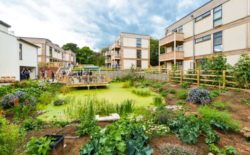Why So Busy? What are we afraid of? Café Psychologique, 27 March
‘There’s not enough time’ must be one of the most commonly uttered complaints in western civilisation. Yet the problem can’t be time. There’s always the same amount of time there ever was: 60 seconds in a minute, 60 minutes in an hour, 24 hours in a day. The problem must be something else. Perhaps it’s our workload or perhaps its an existential cry of angst, protesting about our mortality.
Whatever, the cause, many of us end up very busy, at work and at home. Alarmingly, some of us end up busy even in free time and on holiday. Is it really that there is too much to do, and apparently too litle time to do it in? Or might being busy serve other purposes? Certainly it’s harder for someone to give us something more to do if we are busy already. Busy people must be important people too, surely? Or maybe if we slowed down we would have to look at some of life’s trickier questions. We shall try and think about why we become so busy, what might be driving that, and whether doing less might ever be an option.
This café will be introduced by Andrew Wilson, long-standing café psychologiste, and with professional interest in understanding how long something will take and how much resource it will require.
Andrew will introduce this Café Psychologique on Tuesday 27 March at 8.00 pm to 9.45 pm in Seven Arts, Chapel Allerton, Leeds. The Café costs £4 on the door.
There is a poster to download here:
Café Psychologique March 2018
You can read the Café Rules here: Café Psychologique Rules
End Notes: the importance of mourning, commemoration and accepting loss. Café Psychologique 27 Feb
Humans have always found ways to mark significant losses and ritualise endings, death and transitions. As society in Britain continues to develop and diversify there are simultaneously wider choices how to do this, and also a looser connection to traditional forms of commemoration. Possibly the most difficult time to try to choose how to mark a significant loss is while grief stricken, so there may be comfort in relying on the assumptions and rituals of our cultural, ethnic or faith communities. However, some of us are not engaged by these, or want or need to find our own ways of expressing our desire for commemoration.
Thanatology, the study of death, and its associated practices, has long understood the usefulness of ritual in facing a bereavement and then coming to accept it. This applies too to other forms of significant loss. This café will explore the importance of finding ways to mourn, commemorate losses, and accept them.
This café will be introduced by Ray French, an author and editor. Together with Cath McKay, Ray recently edited End Notes: ten stories about loss, mourning and commemoration. End Notes is a collection of 10 interlinked stories about loss, mourning and commemoration. The eBook is free to download here, as it’s funded by the Arts & Humanities Research Council, which is committed to free and open access for its projects.
Ray will introduce this Café Psychologique on Tuesday 27 February 8.00 pm to 9.45 pm in Seven Arts, Chapel Allerton, Leeds. The Café costs £4 on the door.
There is a poster to download here:
Café Psychologique February 2018
You can read the Café Rules here: Café Psychologique Rules
Achieving your dreams: why you need others to get there. Café Psychologique 30 Jan
‘If everything was going as it should do, there’d be a lot more Ferrari under my bum right now!’ was the reply to my query about how 2018 was going so far. So how are you doing? Sticking with Dry January, Veganuary, losing weight, getting to bed early, saving for a house, or whatever else you hoped to achieve this year? There’s always plenty of pressure from inside and outside us to set goals, achieve targets, reach for the stars (do click that link – you’ll be glad you did. You know what’s coming but you’ll enjoy it, honestly!).
Achieving dreams is hard work, and it’s far too easy to become cynical about achieving anything much. There is a basic mistake many of us make – we are trying to do it on our own. This cafe is all about the way we need others, often surprising others, to achieve the things we want and need.
This café will be introduced by Mark Jarvis, a consultant who specialises in helping teams complete projects successfully. He has also just published Uncle Bob Builds a Boat, a book that explores how to bring people together to achieve a dream. He will introduce this Café Psychologique on Tuesday 30 January, 8.00 pm to 9.45 pm in Seven Arts, Chapel Allerton, Leeds. The Café costs £4 on the door.
There is a poster to download here:
Café Psychologique January 2018
You can read the Café Rules here: Café Psychologique Rules
Seasons and their impact: celebrate or survive? Café Psychologique, 28 November
Seasons define our weather, our daylight, our environment; but their impact goes much wider than that. They dominate our diaries and calendars; our holidays are organised around them, they drive retail sales, they define fashion trends, they set the punctuation of regular family gatherings. They also have a massive impact on mental well-being. At the least, many of us notice and respond well to the longer daylight and warmer temperatures of spring and summer. For others though, the impact is profound, where the impact of Seasonal Affective Disorder makes Winter a trial of depression, anxiety, listlessness and isolation.
We might have thought that the impact of seasons would be dispelled by electric light, by the isolation from the weather of modern transport, by the disconnection from the natural environment of living in cities. Yet, our lives are still readily affected by Christmas shopping, spring wardrobes, summer holidays and autumnal hankering for fireworks and bonfires.
Our responses vary too; one person’s luxuriant sunbathe is another’s perspiring torment; some see sap rising in spring, while others are irritated by gamboling lambs unless served with mint sauce; and while some kick leaves down the lane, others give up going out after five pm for six months.
Whatever your lifestyle, seasons impinge on us; the question is whether we can embrace and enjoy the variety and opportunities they offer, while not being dominated by their disadvantages.
This café will be introduced by Vicky Ola, an artist with an MA in psychology, who is interested in the seasons and will bring an ‘Autumn Tree’ with her to help the conversation along. Se will introduce this Café Psychologique on Tuesday 28 November, 8.00 pm to 9.45 pm in Seven Arts, Chapel Allerton, Leeds. The Café costs £4 on the door.
There is a poster to download here:
Café Psychologique November 2017
You can read the Café Rules here: Café Psychologique Rules
Wellbeing: myth or real possibility? Café Psychologique, 24 October
Wellbeing clearly means very different things to different people: health, comfort, contentment, or even possessions or material wealth. However, it’s clear that newspapers, magazines and endless tv programmes think it’s what we need. Whether it’s bonkers celebrity diets, unfeasibly flexible lycra-clad poses, or an unnervingly superior method to switch off from the worries that assail mere mortals, it can feel like everyone has wellbeing to sell but hardly anyone seems to be able to explain what it is, and how it is genuinely attained.
So finding a translation of the vague aspirations into something tangible can be difficult, and even if that is found it often still seems completely out of reach from within the realities of busy lives, demanding work, and good intentions that stubbornly refuse to transfer into actual change.
This café will explore the nature of wellbeing and whether it is just a myth used to sell products, or actually something realistically achieveable.
The café will be introduced by Joshua Paul Malkin, who helped establish the Network of Wellbeing – a charity that promotes individual wellbeing along with community, societal and environmetal wellbeing. He grew up in Leeds, is a co-convenor of the Civil Society Forum in London and a partner in a Holistic Science consultancy called Transformation Strategies.
He will introduce this Café Psychologique on Tuesday 24 October, 8.00 pm to 9.45 pm in Seven Arts, Chapel Allerton, Leeds. The Café costs £4 on the door.
There is a poster to download here:
Café Psychologique October 2017
You can read the Café Rules here: Café Psychologique Rules
The trouble with Cancer, Café Psychologique, 26 September
Cancer is appallingly common. More than one in three people in the UK will develop some form of cancer during their lifetime. It also seems universally feared. Certainly treatments are improving all the time, and rates of survival rising, but most of us will have known of someone who has died prematurely from cancer or its effects. It holds a particular place in our psyches, as a symbol for suffering, unfairness, devastation. Even it’s treatments are feared, perceived, not always inaccurately, as being invasive, damaging and cruel. Part of this may be because cancer, the big C’, is a shorthand for over 200 different types which vary widely in their presentation, effects, how lethal they are, and how they are treated.
Awful as cancer’s effects can be on the body, it poses a massive assault on the mind too, and not just for the person experiencing cancer. It affects people in obvious ways through the fear of death and dying, the fear of suffering, the fear of physical damage and vulnerability; but it also produces a range of psychological responses, not all obvious. It’s not easy to judge how someone will respond to a cancer diagnosis. Nor is it easy to know what psychological impact there will be, even when treatment is completely successful. Some people find that as the physical treatments and support wind down, that is the point they start to experience a greater psychological challenge. Then there is the psychological impact on all the people around them, family, friends, carers and healthcare professionals. Cancer spreads not just through the body but also through the network of relationships.
This café will focus on the psychological impact of cancer on people with cancer, those around them, and those that treat them. Dr Hannah Gormley is a clinical psychologist and leads Cancer Psychological Services in Calderdale and Huddersfield NHS Foundation Trust. She will introduce this Café Psychologique on Tuesday 26 September, 8.00 pm to 9.45 pm in Seven Arts, Chapel Allerton, Leeds. The Café costs £4 on the door.
There is a poster to download here:
Café Psychologique September 2017
You can read the Café Rules here: Café Psychologique Rules
Attachment: how our connections make us who we are. Café Psychologique 25 July
Genes have an impact. A really big impact. But attachment theory is probably the most widely studied area of psychological theory for understanding the development of human personality, and understanding how that development goes wrong. Early experience of caregivers, especially in situations of stress or danger, seems critical in how we turn out.
But what if the person we turn out to be is not the person we want to be? Do we just blame our parents and caregivers and put up with it? Can we change ourselves, or is change only really possible if based on corrective experiences of healthy relationships that give us what we might have missed? And just how high are the stakes on being a parent and getting that apparently all important attachment right?
Dr Elaine McMullan is a clinical psychologist, and Rebecca Savage is a Senior Programme Manager at the National Institute for Health Research. They will introduce this Café Psychologique on Tuesday 25 July 8.00 pm to 9.45 pm in Seven Arts, Chapel Allerton, Leeds. The Café costs £4 on the door.
There is a poster to download here:
Café Psychologique July 2017
You can read the Café Rules here: Café Psychologique Rules
Growing a home together: Café Psychologique 20 June
The Psychological and Social Impact of Co-housing
A home of my own: a very current preoccupation and aspiration. So what do you do when the cost of it is beyond reach for many, and the impact of having one seems to create as much isolation and separation as the security it is supposed to provide?
Abraham Maslow identified in the 1940s that shelter is as basic a human need as air, food, water and clothing. However, the idea of individualised dwellings built around nuclear families is only one, relatively recent and fairly westernised version of achieving this. People involved in co-housing argue that it is a cheaper, more environmentally sustainable, more enjoyable and more secure a way of achieving more than just shelter. They also suggest that in seeing housing as an investment opportunity we are losing sight of its primary function of shelter, and the wisdom gained through long human experience that building houses into communities provides a more secure basis for societies.
Co-housing, as a model for this, began in Denmark in 1972 and today about 50,000 people live in co-housing in Denmark. Its popularity spread rapidly across Europe and is now emerging worldwide. Leeds is home to several co-housing projects and a new one is well underway in Chapeltown. We are fortunate to welcome Liz Lewis and Lara Eggleton from the well established Lilac project, and Pete Richardson, one of the founders of Chapeltown Co-Housing (ChaCo).
They will introduce this Café Psychologique on Tuesday 20 June 8.00 pm to 9.45 pm in Seven Arts, Chapel Allerton, Leeds. The Café costs £4 on the door.
There is a poster to download here:
Café Psychologique June 2017
You can join in the conversation online on our Facebook page: Café Psychologique
You can read the Café Rules here: Café Psychologique Rules
Hope and Friendship, Café Psychologique 23 May
Why we need hope and friendship, and how to find them
How to survive while the world goes to hell in a handcart
The world can be a tough place and maybe seems tougher than usual at the moment. That might be because of difficult personal circumstances – illness, bereavement, financial stress, pressure at work – or because headlines are dominated by Trump, Brexit, and Elections (and those are the relatively cheerful ones as compared to Syria, North Korea, climate change and global poverty).
So what will keep justifiable despair at bay; and if you believe that you do need to keep going how do you do that? Psychologists tend to agree that Hope and Friendship are two vital ingredients in helping people face and overcome difficulty, and find a way of keeping a sense of purpose and fulfillment. These seem crucial to happiness.
However, bad news and repeated setbacks militate against hope; and the powerful drive to blame and suspicion in difficult times might prompt us to withdraw from people. This café will explore how and why hope and friendship arise, often against the odds. We’ll also think about how to find hope and friendship when you feel like giving up.
Dr Nick Lalvani works in mental health recovery and will introduce this Café Psychologique on Tuesday 23 May, 8.00 pm to 9.45 pm in Seven Arts, Chapel Allerton, Leeds. The Café costs £4 on the door.
There is a poster to download here:
Café Psychologique May 2017
You can join in the conversation online on our Facebook page: Café Psychologique
You can read the Café Rules here: Café Psychologique Rules
Café Psychologique 25 April, Burnout
The effects of chronic stress, and how to slow down and recharge
Why do so many people end up burning up and worn out? Why do we become frazzled, emotionally exhausted, disengaged and depleted? What’s going on? Are we not resilient enough or are we giving too much? Why can’t we stop, slow down and recharge?
Newspaper lifestyle sections regularly feature ‘Burnout’ but swing widely between offering sympathetic tips for coping one day, and deriding so called ‘first world problems’ and exhorting readers to be more resilient and buckle down to the challenge of 21st century living the next.
In reality, the experience of burnout is likely to become a real healthcare problem if chronic stress is not addressed. Some of this might be dealt with by individuals, but it’s more often the case that social factors are creating the conditions for burnout to occur, and it can be very difficult for individuals to resist the demands of others in workplaces, universities, schools and homes.
Sally Rose is a Psychotherapist and Mindfulness Teacher from the Staff Counselling and Psychological Support Service at the University of Leeds. She will initiate an exploration of burnout as a personal and social condition, and the challenge of slowing down to regulate energy and resources.
Join the conversation at Café Psychologique Leeds, on Tuesday 25 April, 8.00 pm to 9.45 pm in Seven Arts, Chapel Allerton, Leeds. The Café costs £4 on the door.
There is a poster to download here:
Café Psychologique April 2017
You can join in the conversation online on our Facebook page: Café Psychologique
You can read the Café Rules here: Café Psychologique Rules
Category









